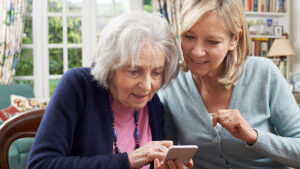DorsaVi wants nurses to wear body sensors to help avoid workplace injury

DorsaVi wants nurses to wear body sensors to reduce injuries. Pic: Getty.
Nurses rank alongside brickies and truckies as the worst occupations for workplace injuries because of regular lifting of heavy patients — often from awkward positions.
Healthcare is the most dangerous profession for Australian women, accounting for 29 per cent of the 208,000 females who suffer a work-related injury or illness each year, according to the bureau of statistics.
That’s a big opportunity for high-tech therapist DorsaVi (ASX:DVL), which makes body sensors to monitor workers for unsafe movements.
This week DorsaVi announced its technology would be rolled out in one of Australia’s biggest aged care providers, Japara Healthcare (ASX: JHC).
DorsaVi’s “myVisafe” sensors are stuck to the back or shoulders to measure a worker’s movements and identify potential exposure to injuries through repetitive movements involved in manual handling.
The data is fed back to a worker’s phone or tablet app to suggest improvements to daily practices.
Japara workers have already been assessed at 45 aged care homes and retirement complexes.
“The sensors allow for the company to monitor staff on a more regular basis and do spot checks to make personal training more effective,” marketing officer Megan Connell said.
“Data collected is more comprehensive than just observational analysis because we can get the exact angles or the combination of back and shoulder strain in real time so health and safety officers don’t need to be occupational therapists as well. The system has all the smarts to analyse how someone moves.”
The sensor technology also has applications in clinical therapy and elite sports and has been used with the LA Lakers in the NBA and the New England Patriots in the NFL.
Chaired by former middle-distance champion Herb Elliot, the technology is capitalising on the growth of wearables.
“With our first mover advantage in medical-grade wearable technology and the aforementioned milestones, our products continue to gain traction with major workforce employers, clinicians and elite sports clubs across all our three priority markets; the US, UK and Australia,” Mr Elliot said in the company’s annual report.
The company reported a $3.8 million loss last year, but banked $1.9 million in revenue for its occupational health services.
DorsaVi’s shares fell 1c to 28c on Wednesday, near the botom of their 22c to 60c trading range over the past year. The company is worth about $47 million.
UNLOCK INSIGHTS
Discover the untold stories of emerging ASX stocks.
Daily news and expert analysis, it's free to subscribe.
By proceeding, you confirm you understand that we handle personal information in accordance with our Privacy Policy.








